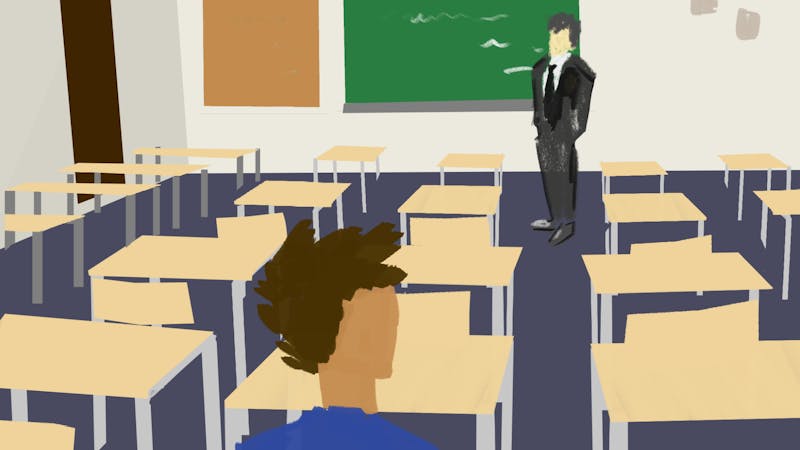Professors reflect on distribution classes
Any Rice undergraduate who has sought academic advice from other students will more likely than not have heard the words “easy distribution credit.” It should come as no surprise that positively skewed grade distributions, light work loads and generous course reviews are tantalizing features to students looking to knock out graduation requirements. From the student’s point of view, it is entirely clear why taking a low effort “blow off” instead of a more demanding course is a desirable, even strategic option.
But for the professors teaching distribution courses, the process is anything but low effort. Peer over the sea of heads in Herring Hall’s auditorium during one of Jeffery Kripal’s lectures, and you will be hard-pressed to find a student with an open laptop or cellphone.
“I decided to ban technology from the classroom,” Kripal, who teaches Introduction to the Study of Religion (RELI 101), said. “I’ve seen students on Facebook or YouTube or shopping for whatever.” Kripal prohibited laptops and cellphones four years ago to combat what he calls student apathy.
“I am very aware that the majority of students in [my] class really don’t care,” Kripal said. “It’s very dispiriting.”
At a current enrollment of 196 students, RELI 101 is one of the university’s most popular undergraduate courses. Offered every fall, the course features a lecture format in which the final grade is based on 10 reading quizzes and two multiple choice examinations. Last year, more than 80 percent of students who took the course fi nished with an A. Upon successful completion of RELI 101, students receive three hours of humanities (D1) distribution credit.
“The requirements are not onerous,” Kripal said. “There’s no paper … So they take it as a class that they think will be easy.
Minh Nguyen, a chemical engineering major who took RELI 101 last year, said the course provided a break from her more demanding major requirements.
“I needed a D1,” Nguyen, a Jones College sophomore, said. “And I heard it was easy. You read, you get a basic comprehension, and that was it. And I wouldn’t have to put in much effort to getting a good grade.”
But according to Kripal, he is not striving for course difficulty. “I made a conscious decision to keep it big,” Kripal said. “If you can get 200 to 250 young people ... to read serious discussion about what religion is or isn’t, some of them will be moved by that, and their minds will open. They’ll be changed by that experience.”
According to Kripal, while this process can be frustrating, he believes it is the best way to get students interested in his field.
“Lecturing in RELI 101, the image that always comes to my mind is throwing a Kleenex off the Grand Canyon,” Kripal said. “And yet, every time we teach that course, we get half a dozen majors out of it each time. We teach it big to plant as many intellectual seeds as we can.”
On the other end of the pedagogical spectrum lies Greek Civilization and Legacy (HUMA 107), taught by Harvey Yunis. Like Kripal, Yunis has taken measures to keep his students interested in the material. However, Yunis’ teaching style differs from Kripal’s in virtually every way. “I refuse to look at passive students and lecture at them,” Yunis said. “Students who are being lectured at sometimes fall asleep — literally ... The only way at my disposal to get students interested is through serious and direct engagement.”
Yunis’ class, also a D1, features a discussionbased approach, in which 50 percent of the grade is based on classroom attendance, preparation and participation. Around 20 percent of students who took the course received an A in fall 2013.
“Students who do not show up, are not prepared and do not participate in class discussions on a regular basis are, naturally, liable to fail the course,” Yunis said.
Yunis said he does not consider his course to be particularly difficult, but HUMA 107 does not draw nearly as many students as RELI 101. Currently, five students are enrolled in the class, a figure that falls significantly short of the 40 student maximum.
According to Yunis, the level of apathy toward coursework among students is regrettable. However, he said the problem does not lie in the distribution system itself. “It is just a fact of academic life that some students will fulfi ll the requirement while blowing o courses,” Yunis said.
Yunis said Rice undergraduates should value the opportunities to learn distribution offers.
“The student’s purpose here is not merely to pass the courses,” Yunis said. “If you’re just at Rice to acquire a kind of qualifi cation stamp, you’re not using Rice properly.”
Kripal and Yunis face opposite problems — one with engagement, and one with retention — but share the same goal of inspiring students with their subject. According to Kripal, neither pedagogical approach is necessarily better to than the other.
“I’m not a weed-out kind of guy,” Kripal said. “I’m a reach-as-many-people-as-I-can kind of guy.” Yunis said he tries to engage students but knows he does not control their behavior.
“Students are busy, have other majors, have their lives to live,” Yunis said. “If they are unwilling to buy into the way I teach my Greek [Civilization] course, that’s no problem. There are other courses they can take to meet the requirement.”
According to Kripal, pedagogy can do only so much to address the larger cultural forces that are responsible for widespread apathy.
“I think the apathy is not a Rice problem, it’s a cultural problem,” Kripal said. “The role of the arts and literature and philosophy and religion — those are not rewarded fi nancially or professionally the way technology is. And those are choices our culture has made. I don’t blame the administration or the faculty or the students. We’re all swimming in the same sea.”
Both Kripal and Yunis said despite cultural apathy, they believe the humanities should thrive at Rice.
“We can be entirely different human beings if we chose,” Kripal said. “Those are cultural and social choices. I couldn’t do what I do if I didn’t believe that.”
More from The Rice Thresher

Jones wins men’s and women’s Beer Bike races, GSA snags alumni
Jones College won both the women’s and men’s Beer Bike 2024 races, while the Graduate Student Association claimed the alumni team win. Hanszen College bike teams were the runner-up in the alumni and men’s races, while Brown College was the runner-up in the women’s race. Martel and McMurtry Colleges did not bike in the alumni race, according to the Rice Program Council’s final report, and the GSA was disqualified from the men’s race for accidentally sending out two bikers simultaneously.

Rice wraps up Conversations on the Middle East series, looks to fall semester
With the final session rescheduled to Wednesday April 17, the Conversations on the Middle East series is coming to a close.

Rice SJP hosts protest in response to S.RES 02 tabling
Rice Students for Justice in Palestine staged a walkout and protest in response to the tabling of S.RES 02, a resolution that proposed a divestment of student funds to Israel-aligned companies, outside the Allen Center, April 12. The protest occurred during Owl Days, when prospective students were touring the campus.

Please note All comments are eligible for publication by The Rice Thresher.